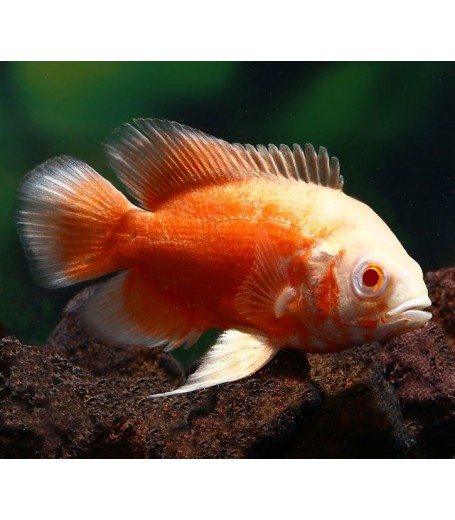ALBINO RED OSCAR
- RM0.00
Origin
The oscar fish is found in parts of South America, including Argentina, Brazil, Colombia, Paraguay, Peru, Uruguay, and Venezuela. The fish swim throughout the freshwater Amazon and Orinoco Rivers and tributaries, enjoying the warm water temperatures and moderate-to-fast currents of these biodiverse environments.
Varieties of oscar fish have been bred in and introduced to other parts of the world, including Africa, Southern Asia, and North America. Oscar fish are also found in parts of French Guiana and Suriname.
Wild populations of oscar fish are common, and the fish are classed as non-extinct.
Adult Size & Lifespan
Full-grown oscar fish reach up to 12 inches in length. In the wild, oscar fish grow even longer, reaching lengths of up to 14 inches.
Oscar fish are monomorphic, which means there are no obvious differences between males and females in size or physical appearance.
In captivity, oscar fish live between eight and 15 years. In the wild, the fish live up to 20 years. Males and females have the same average lifespans.
Oscar Fish Care & Tank Requirements
Oscar fish have moderate care needs. Replicating the oscar fish’s freshwater tropical habitat and varied omnivorous diet is easy. However, because of the oscar fish’s aggressive tendencies, the fish requires extra care when housing with other fish species.
A large tank, consistent water parameters, and a strong water flow are the three most important tank requirements for oscar fish. You should feed oscar fish a healthy, varied diet of live foods, pellet foods, and plant matter.
Habitat and Tank Requirements
In the wild, oscar fish are found in the freshwater Amazon and Orinoco Rivers and tributaries. The oscar fish’s natural habitat is one of the most biodiverse environments on the planet, and you should aim to replicate this habitat in the aquarium, with warm, tropical waters and varied plant species.
To recreate the oscar fish’s natural habitat, fill a large, freshwater tank and introduce a soft, sandy substrate with debris, vegetation, and rocks scattered on top.
Tank decorations like caves and plants like Java fern and Java moss can be used to replicate the rocky riverbed and underwater greenery.
Oscar fish enjoy digging in the substrate and rearranging the tank, so plants should be hardy and firmly rooted, and tank decorations should be firmly fixed in place.
Tank Mates
Due to their aggressive, territorial personalities, oscar fish shouldn’t be housed with the majority of fish species.
Although oscar fish are used to being surrounded by other fish species in the wild, tensions can rise in a tank with limited space, causing fights, bullying, and fin-nipping. Housing these fish alone is best.
However, if you wish to establish a community tank, choose large, passive fish that won’t get in the way of oscar fish.
Great tank mates for oscar fish include:
- Bichirs
- Firemouth cichlids
- Silver dollars
- Jaguar cichlids
- Green terrors
- Sailfin plecos
- Convict cichlids
- Arowanas
- Severum cichlids
Diet and Feeding
In the wild, oscar fish eat a varied diet of larvae, small fish, and plant matter. As omnivorous, opportunistic fish, oscar fish eat anything they can find, and you should replicate this varied diet in captivity.
Feed oscar fish a combination of store-bought pellets or flakes, live/frozen food like daphnia and brine shrimp, and plant-based foods like algae wafers or green vegetables. Oscar fish have natural hunting instincts and enjoy catching and eating live food.
Split feeding into two or three sessions per day. In each session, only feed the oscar fish as much food as they can eat within two minutes.
| Scientific name: | Astronotus ocellatus |
| Common names | Oscar fish, oscar cichlid, tiger oscar, velvet cichlid, marble cichlid |
| Distribution: | South America (Argentina, Brazil, Colombia, Paraguay, Peru, Uruguay, and Venezuela) |
| Size: | 10–12 inches |
| Life expectancy: | 15–20 years |
| Color: | Orange and black/brown marbled colors |
| Diet: | Omnivore |
| Temperament: | Aggressive |
| Minimum tank size: | 55 gallons |
| Temperature: | 74–81°F (23–27°C) |
| pH: | 6–8 |
| Hardness: | 5–20 dGH |
| Care level: | Moderate |
| Breeding: | Egg depositor |
Reviews
There are no reviews for this product.



